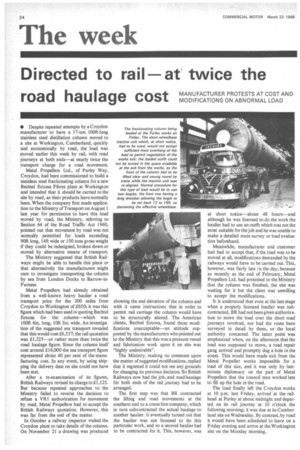Directed to rail at twice the
Page 26

If you've noticed an error in this article please click here to report it so we can fix it.
road haulage cost
MANUFACTURER PROTESTS AT COST AND MODIFICATIONS ON ABNORMAL LOAD
• Despite repeated attempts by a Croydon manufacturer to have a 17-ton 100ft-long stainless steel distillation column moved to a site at Workington, Cumberland, quickly and economically by road, the load was moved earlier this week by rail, with road journeys at both ends—at nearly twice the transport charge for a road movement.
Metal Propellers Ltd., of Purley Way, Croydon, had been commissioned to build a stainless steel fractionating column for a new Bechtel Ectona Fibres plant at Workington and intended that it should be carried to the site by road, as their products have normally been. When the company first made application to the Ministry of Transport on August 1 last year for permission to have this load moved by road, the Ministry, referring to Section 64 of the Road Traffic Act 1960, pointed out that movement by road was not normally permitted for loads exceeding 90ft long, 14ft wide or 150 tons gross weight if they could be redesigned, broken down or moved by alternative means of transport.
The Ministry suggested that British Railways might be able to handle this piece or that alternatively the manufacturers might care to investigate transporting the column by sea from London Docks to Barrow-inFurness.
Metal Propellers had already obtained from a well-known heavy haulier a road transport price for the 300 miles from Croydon to Workington of £650; it was this figure which had been used in quoting Bechtel Ectona for the column—which was 100ft 6in. long, 10ft 3in. wide. An investigation of the suggested sea transport revealed that this would cost £6,537; the rail quotation was £1,325—or rather more than twice the road haulage figure. Since the column itself cost around £16,000 the sea transport figure represented about 40 per cent of the manufacturing cost. In any event, by using shipping the delivery date on site could not have been met.
After a re-examination of its figures, British Railways revised its charge to £1,125. But because repeated approaches to the Ministry failed to reverse the decision to refuse a VR I authorization for movement by road, Metal Propellers had to accept the British Railways quotation. However, this was far from the end of the matter.
In October a railway inspector visited the Croydon plant to take details of the column. On November 21 a drawing was produced showing the end elevation of the column and with it came instructions that in order to permit rail carriage the column would have to be structurally altered. The American clients, Bechtel Ectona, found these modifications unacceptable—an attitude supported by the manufacturers who pointed out to the Ministry that this was a pressure vessel and fabrication work upon it on site was "highly undesirable".
The Ministry, making no comment upon the matter of suggested modifications, replied that it regretted it could not see any grounds for changing its previous decision. So British Railways now had the job, and road haulage for both ends of the rail journey had to be arranged.
The first step was that BR contracted the lifting and road movements at the southern end to a crane hire company, which in turn subcontracted the actual haulage to another haulier. It eventually turned out that the haulier was not licensed to do this particular work, and so a second haulier had to be contracted for it. This, however, was at short notice—about 48 hours—and although he was licensed to do the work the haulier had to use an outfit which was not the most suitable for the job and he was unable to make a detailed route survey or load evaluation beforehand.
Meanwhile, manufacturer and customer had had to accept that, if the load was to be moved at all, modifications demanded by the railways would have to be carried out. This, however, was fairly late in the day, because as recently as the end of February, Metal Propellers Ltd. had protested to the Ministry that the column was finished, the site was waiting for it but the client was unwilling to accept the modifications.
It is understood that even at the late stage when a properly licensed haulier was subcontracted, BR had not been given authoriz ation to move the load over the short road journeys involved, nor had the route been surveyed in detail by them, or the local authority contacted. The latter point was emphasized when, on the afternoon that the load was supposed to move, a road repair gang arrived and promptly dug a hole in the street. This would have made exit from the Metal Propeller works impossible for a load of this size, and it was only by lastminute diplomacy on the part of Metal Propellers that the council men worked late to fill up the hole in the road.
The load finally left the Croydon works at 10 pm. last Friday, arrived at the railhead at Purley at about midnight and departed on its rail journey at 10 o'clock the following morning; it was due at its Cumberland site on Wednesday. By contrast, by road it would have been scheduled to leave on a Friday evening and arrive at the Workington site on the Monday morning.












































































































